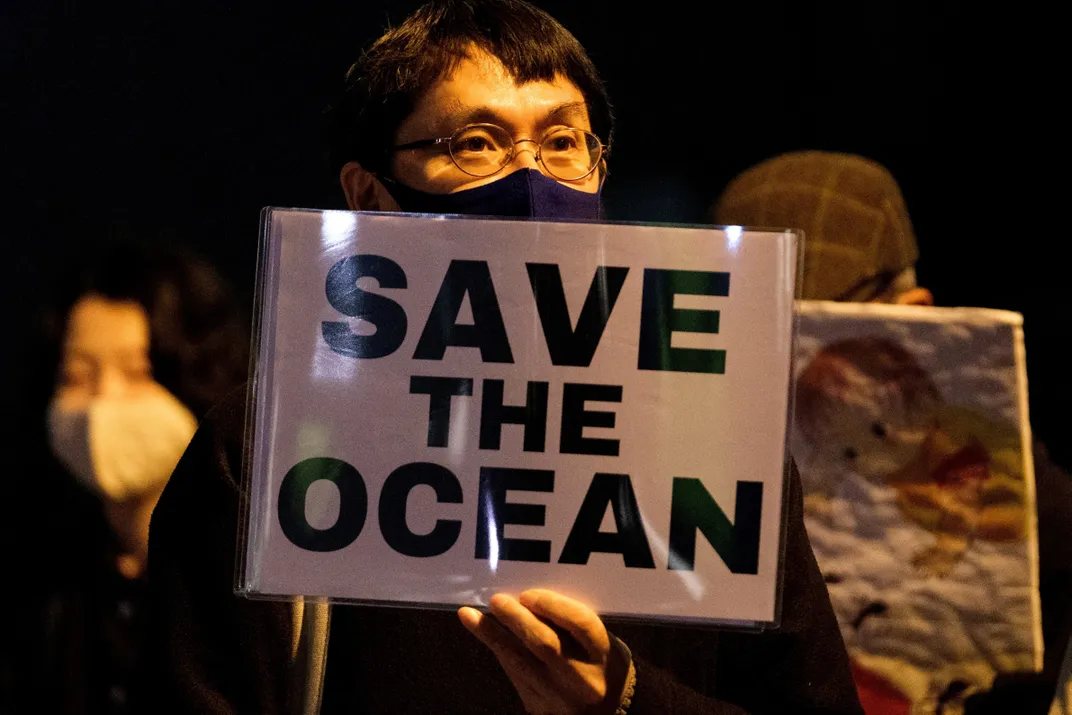Japan Will Release Fukushima Nuclear Plant Wastewater Into Ocean
Ten years after the Fukushima nuclear disaster, the site is running out of space to store tritium-containing wastewater
/https://tf-cmsv2-smithsonianmag-media.s3.amazonaws.com/filer/92/ca/92cadaf8-c9dc-4aba-8d50-88fa0ab9f56d/gettyimages-1232275720.jpg)
On Tuesday, the Japanese government announced its intention to gradually release the water used to cool the Fukushima Daiichi plant’s nuclear reactors into the ocean. The cabinet will meet within the week to develop a specific plan, Jennifer Jett and Ben Dooley report for the New York Times.
The decision comes a month after the ten-year anniversary of the magnitude-9.0 earthquake and following tsunami that killed over 15,000 people, forced hundreds of thousands to evacuate their homes and critically damaged the nuclear power plant in Fukushima. Over the last decade, the Tokyo Electric Power Company, which operates the plant, has continued pumping about 170 tons of cooling water per day over the damaged reactor cores to prevent a meltdown. The water is then treated and stored in tanks on site, but space is running low.
"Disposing of the treated water is an unavoidable issue for decommissioning the Fukushima Daiichi plant," said Prime Minister Yoshihide Suga during the cabinet meeting, after the officials had finalized the decision. The prime minister also vowed to ensure compliance with safety protocols and to protect the region’s fishing industry, reports Kyodo News.
When the water runs over the reactor cores, it becomes contaminated with radioactive chemicals. The water is then treated to remove most of the radioactive elements, but not tritium, which is a heavy form of hydrogen. Because water molecules are made of one oxygen atom and two hydrogen atoms—giving it the name H2O—water molecules sometimes incorporate tritium, making it impossible to filter out of the wastewater.

There are currently 1.25 million tons of tritium-containing, treated cooling water stored at the nuclear plant. TEPCO says its storage capacity is 1.37 million tons, so the plant could run out of space to store the water by next fall, reports Mari Yamaguchi for the Associated Press.
Tritium has a half-life of about 12 years, which means it will take decades to disappear from the environment, unlike other radioactive waste that takes centuries to degrade, reports BBC News. The initial plan announced by the Japanese government is to dilute the tritium to a 2.5 percent concentration of radiation allowed by Japanese safety standards, and one-seventh of the standard allowed by the World Health Organization, before releasing it into the ocean, per Kyodo News.
The slow process of diluting and releasing the water could take about 40 years, reports the AP. And it could still be completed before the plant is fully decommissioned and cleaned.
"Releasing into the ocean is done elsewhere. It's not something new. There is no scandal here," says the director general of the International Atomic Energy Agency, Rafael Mariano Grossi, in a statement, per BBC News. But “the large amount of water at the Fukushima plant makes it a unique and complex case.”
The U.S. State Department also released a statement in support of the plan, stating “Japan has weighed the options and effects, has been transparent about its decision, and appears to have adopted an approach in accordance with globally accepted nuclear safety standards.”
But in Japan and its neighboring countries, the decision has brought backlash. Protestors gathered in Tokyo and Fukushima in opposition. Workers in the fishing industry had long opposed the idea of releasing the tritium-containing water into the ocean because of the reputational impact it could have. The plan released this week says TEPCO will need to pay local fishermen who lose work because of the decision, but doesn’t outline how the price will be determined, per Kyodo News.
"The government and TEPCO said that without consent from the fishing communities, they won't discharge the contaminated water," says Ayumi Fukakusa, a campaigner at Friends of the Earth Japan, to Anthony Kuhn at NPR. "That promise was completely broken."
The Japan Times’ Osamu Tsukimori reported in March that the fishing industry was just beginning to return to normalcy after years of both reputational damage and heightened levels of dangerous elements like cesium in the fish caught near Fukushima. And Fukakusa tells NPR when the government gathered residents’ opinions about how to move forward, they primarily surveyed men and left out women.
Japan’s neighboring countries also opposed the decision on Tuesday, reports Kyodo News. China’s Foreign Ministry released a statement that the release of the cooling water would "hurt the interest of the people in neighboring countries." Taiwan’s Atomic Energy Council called the decision regrettable, and the South Korean Foreign Ministry summoned the Japanese ambassador to formally protest the decision.